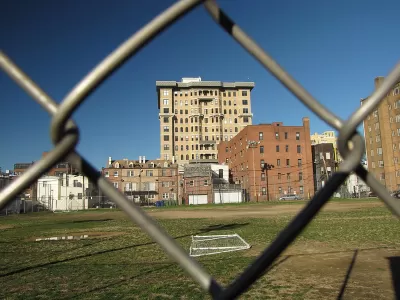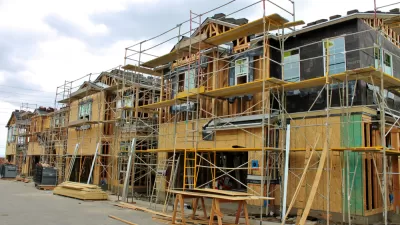The Height Act is up for debate again in Washington, D.C., amidst an emotional debate about housing affordability.

Martin Austermuhle reports on a new of questions connecting the D.C. Height Act with skyrocketing housing prices.
For the past 110 years, a federal law known as the Height Act has set a limit on how tall buildings in the city can be. Supporters of the law say it has created an iconic and eminently livable city free of skyscrapers that can create concrete canyons and cast ever-present shadows along streets and homes.
Others, however, say there's a link between the Height Act and the quickly rising cost of rent in the nation's capital.
The article includes a primer on the D.C. Height Act, which includes a few surprises if you've ever been privy to some of the (false) folklore on the subject. Also included are sections devoted to discussing the height act with Christopher Leinberger, prominent local supporters of the height act, and the ongoing debate about how to control housing prices in the District—Height Act reform or not.
FULL STORY: Low Skyline, High Prices: Would Taller Buildings Help Make Housing Cheaper In D.C.?

Trump Administration Could Effectively End Housing Voucher Program
Federal officials are eyeing major cuts to the Section 8 program that helps millions of low-income households pay rent.

Planetizen Federal Action Tracker
A weekly monitor of how Trump’s orders and actions are impacting planners and planning in America.

Ken Jennings Launches Transit Web Series
The Jeopardy champ wants you to ride public transit.

Crime Continues to Drop on Philly, San Francisco Transit Systems
SEPTA and BART both saw significant declines in violent crime in the first quarter of 2025.

How South LA Green Spaces Power Community Health and Hope
Green spaces like South L.A. Wetlands Park are helping South Los Angeles residents promote healthy lifestyles, build community, and advocate for improvements that reflect local needs in historically underserved neighborhoods.

Sacramento Plans ‘Quick-Build’ Road Safety Projects
The city wants to accelerate small-scale safety improvements that use low-cost equipment to make an impact at dangerous intersections.
Urban Design for Planners 1: Software Tools
This six-course series explores essential urban design concepts using open source software and equips planners with the tools they need to participate fully in the urban design process.
Planning for Universal Design
Learn the tools for implementing Universal Design in planning regulations.
Heyer Gruel & Associates PA
Ada County Highway District
Institute for Housing and Urban Development Studies (IHS)
City of Grandview
Harvard GSD Executive Education
Toledo-Lucas County Plan Commissions
Salt Lake City
NYU Wagner Graduate School of Public Service





























